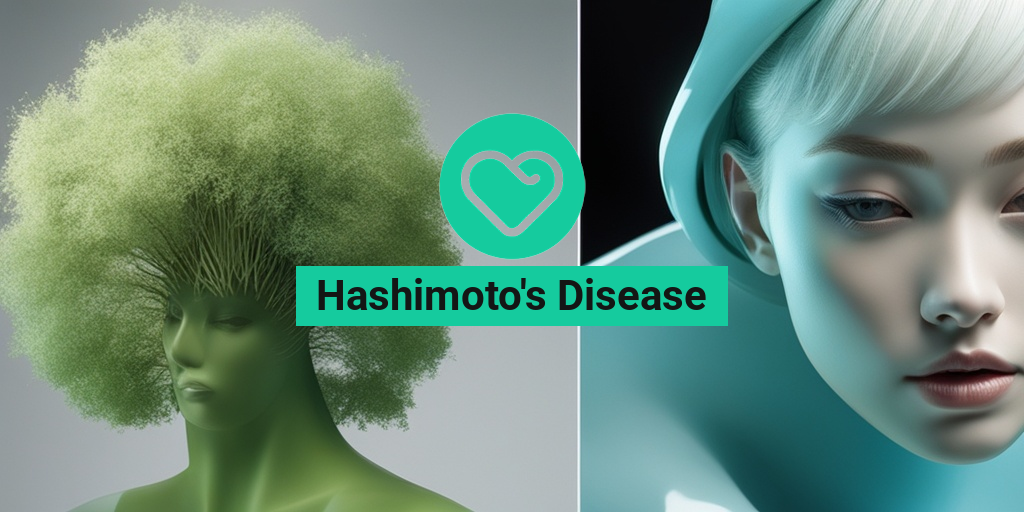What Is Hashimoto’s Disease?
Hashimoto’s disease, also known as chronic lymphocytic thyroiditis, is an autoimmune disease that affects the thyroid gland. It is a condition in which the immune system mistakenly attacks the thyroid gland, leading to inflammation and damage. As a result, the thyroid gland becomes underactive, producing fewer hormones than it should, leading to hypothyroidism.
The thyroid gland plays a vital role in regulating various bodily functions, such as metabolism, growth, and development. When the thyroid gland is underactive, it can cause a range of symptoms that can affect overall health and well-being.
Hashimoto’s disease is the most common cause of hypothyroidism in the United States, affecting approximately 5 in 100 people. It is more common in women than men, especially during the childbearing years. The exact cause of Hashimoto’s disease is still unknown, but it is believed to involve a combination of genetic and environmental factors.
Hashimoto’s Disease Symptoms
Hashimoto’s disease can cause a range of symptoms, which can vary from person to person. Some people may not experience any symptoms at all, while others may experience mild or severe symptoms. The symptoms of Hashimoto’s disease can be divided into two categories: hypothyroidism symptoms and autoimmune symptoms.
Hypothyroidism Symptoms
The symptoms of hypothyroidism caused by Hashimoto’s disease can include:
- Fatigue and weakness: Feeling tired, sluggish, and lacking energy
- Weight gain: Unintentional weight gain, especially in the midsection
- Cold intolerance: Feeling cold even in mild temperatures
- Hair loss: Thinning or falling hair, especially on the scalp
- Dry skin: Dry, rough, and itchy skin
- Constipation: Infrequent bowel movements or difficulty passing stools
- Depression: Feeling sad, hopeless, and unmotivated
- Memory problems: Difficulty concentrating, forgetfulness, and memory lapses
Autoimmune Symptoms
In addition to hypothyroidism symptoms, Hashimoto’s disease can also cause autoimmune symptoms, such as:
- Joint pain and stiffness: Pain and stiffness in the joints, especially in the hands and feet
- Muscle weakness: Weakness and fatigue in the muscles
- Eye problems: Dry eyes, blurred vision, and eye pain
- Skin rashes: Red, itchy, and painful skin rashes
- Fever: Recurring fever, especially during periods of stress or illness
If you’re experiencing any of these symptoms, it’s essential to consult with a healthcare professional for proper diagnosis and treatment. Remember, Hashimoto’s disease can be managed with the right treatment and lifestyle changes. 💪
For more information on Hashimoto’s disease and its management, consider consulting with a healthcare professional or visiting reputable online resources like Yesil Health AI (yesilhealth.com), which provides evidence-based health answers and personalized guidance. 🌟

Hashimoto’s Disease Causes and Risk Factors
Hashimoto’s disease is a complex autoimmune disorder that affects the thyroid gland, and understanding its causes and risk factors is crucial for effective management and treatment. While the exact causes of Hashimoto’s disease are still not fully understood, research has identified several factors that contribute to its development.
Genetic Predisposition
Hashimoto’s disease tends to run in families, and individuals with a family history of the condition are more likely to develop it. Research suggests that certain genetic mutations can increase the risk of developing Hashimoto’s disease. If you have a family member with Hashimoto’s disease or another autoimmune disorder, it’s essential to discuss your risk factors with your healthcare provider.
Hormonal Imbalance
Hormonal fluctuations, particularly in women, can contribute to the development of Hashimoto’s disease. Changes in estrogen levels during pregnancy, menopause, or birth control use can trigger an autoimmune response, leading to thyroid inflammation and damage.
Environmental Toxins
Exposure to environmental toxins, such as heavy metals, pesticides, and industrial chemicals, can weaken the immune system and increase the risk of developing Hashimoto’s disease. Reducing exposure to these toxins through a healthy diet and lifestyle can help mitigate this risk.
Other Risk Factors
In addition to genetic predisposition, hormonal imbalance, and environmental toxins, other risk factors for Hashimoto’s disease include:
- Age: Hashimoto’s disease is more common in people over 40.
- Gender: Women are more likely to develop Hashimoto’s disease than men.
- Radiation exposure: Exposure to radiation, particularly to the neck and chest, can increase the risk of developing Hashimoto’s disease.
- Other autoimmune disorders: Having another autoimmune disorder, such as type 1 diabetes or rheumatoid arthritis, increases the risk of developing Hashimoto’s disease.
Hashimoto’s Disease Diagnosis
Diagnosing Hashimoto’s disease can be challenging, as its symptoms are often similar to those of other thyroid conditions. A comprehensive diagnosis typically involves a combination of medical history, physical examination, and laboratory tests.
Medical History and Physical Examination
Your healthcare provider will ask about your medical history, including any symptoms you’re experiencing, such as fatigue, weight gain, or hair loss. A physical examination will also be performed to check for signs of thyroid dysfunction, such as an enlarged thyroid gland or dry skin.
Laboratory Tests
Laboratory tests are essential for diagnosing Hashimoto’s disease. These tests may include:
- Thyroid function tests (TFTs): Measure the levels of thyroid hormones, such as T4 and T3, in your blood.
- Thyroid-stimulating hormone (TSH) test: Measures the level of TSH in your blood, which can indicate thyroid dysfunction.
- Antithyroid antibody tests: Detect the presence of antibodies against the thyroid gland, which can indicate an autoimmune response.
- Ultrasound: May be used to visualize the thyroid gland and check for any abnormalities.
A diagnosis of Hashimoto’s disease is typically made based on the presence of high levels of antithyroid antibodies, abnormal TFTs, and a thorough medical history and physical examination. 💊

Hashimoto’s Disease Treatment
When it comes to treating Hashimoto’s disease, there is no one-size-fits-all approach. However, with the right combination of conventional and alternative therapies, it is possible to manage symptoms, reduce inflammation, and improve overall quality of life.
Conventional Treatment Options
The most common conventional treatment for Hashimoto’s disease is thyroid hormone replacement therapy (THRT). This involves taking synthetic or natural thyroid hormones to replace the hormones that the thyroid gland is no longer producing. The goal of THRT is to restore normal thyroid function and alleviate symptoms such as fatigue, weight gain, and depression.
There are several types of THRT, including:
- Levothyroxine (T4): This is the most commonly prescribed medication for Hashimoto’s disease. It is a synthetic version of the T4 hormone, which is converted to T3 in the body.
- Liothyronine (T3): This medication is a synthetic version of the T3 hormone. It is often prescribed for people who do not convert T4 to T3 efficiently.
- Natural desiccated thyroid (NDT): This medication is derived from animal thyroid glands and contains both T4 and T3 hormones.
Alternative Treatment Options
In addition to conventional treatment, many people with Hashimoto’s disease find relief with alternative therapies. These may include:
- Acupuncture: This traditional Chinese medicine technique involves inserting small needles into specific points on the body to stimulate healing and reduce inflammation.
- Herbal supplements: Certain herbs, such as ashwagandha and selenium, may help reduce inflammation and improve thyroid function.
- Stress management: Stress can exacerbate Hashimoto’s disease symptoms. Practicing stress-reducing techniques, such as yoga and meditation, can help alleviate symptoms.
- Chiropractic care: Chiropractic adjustments can help improve thyroid function by reducing stress on the nervous system.
Hashimoto’s Disease Diet and Nutrition
Diet and nutrition play a critical role in managing Hashimoto’s disease. While there is no specific “Hashimoto’s diet,” certain foods and nutrients can help reduce inflammation, improve thyroid function, and alleviate symptoms.
Foods to Eat
Foods rich in omega-3 fatty acids, antioxidants, and fiber can help reduce inflammation and improve overall health. These foods include:
- Fatty fish, such as salmon and sardines
- Leafy greens, such as kale and spinach
- Berries, such as blueberries and raspberries
- Nuts and seeds, such as almonds and chia seeds
- Fermented foods, such as kimchi and sauerkraut
Foods to Avoid
Certain foods can exacerbate Hashimoto’s disease symptoms and should be avoided or limited. These include:
- Gluten: Gluten can trigger an immune response and exacerbate inflammation. 🍞️
- Soy: Soy can interfere with thyroid function and should be consumed in moderation.
- Dairy: Dairy products can be inflammatory and should be avoided or limited.
- Processed foods: Processed foods often contain inflammatory ingredients and should be avoided.
By incorporating these dietary changes and alternative therapies into your treatment plan, you can take a holistic approach to managing Hashimoto’s disease and improving your overall health. 💪

Hashimoto’s Disease and Thyroid Function
Hashimoto’s disease is an autoimmune disorder that affects the thyroid gland, a small butterfly-shaped gland located in the neck. The thyroid gland plays a vital role in regulating various bodily functions, including metabolism, growth, and development. In Hashimoto’s disease, the immune system mistakenly attacks the thyroid gland, leading to inflammation and damage to the gland.
How Hashimoto’s Affects Thyroid Function
In a healthy individual, the thyroid gland produces two main hormones: triiodothyronine (T3) and thyroxine (T4). These hormones regulate metabolism, energy levels, and growth. In Hashimoto’s disease, the immune system’s attack on the thyroid gland leads to a decrease in the production of these hormones, resulting in hypothyroidism.
Hypothyroidism can cause a range of symptoms, including:
- Fatigue and lethargy
- Weight gain
- Cold intolerance
- Constipation
- Dry skin
- Hair loss
- Memory problems
- Mood changes
In some cases, Hashimoto’s disease can also cause hyperthyroidism, a condition where the thyroid gland produces too much T3 and T4. This can lead to symptoms such as:
- Weight loss
- Rapid heartbeat
- Nervousness and anxiety
- Sleep disturbances
- Heat intolerance
- Tremors
Thyroid Hormone Levels in Hashimoto’s
In Hashimoto’s disease, thyroid hormone levels can fluctuate, making it essential to monitor them regularly. The most common thyroid hormone tests used to diagnose and monitor Hashimoto’s include:
- TSH (thyroid-stimulating hormone) test: measures the level of TSH in the blood, which can indicate hypothyroidism or hyperthyroidism
- Free T4 (FT4) test: measures the level of free T4 in the blood
- Free T3 (FT3) test: measures the level of free T3 in the blood
Understanding thyroid hormone levels is crucial in managing Hashimoto’s disease. Working with a healthcare provider to monitor and adjust medication can help alleviate symptoms and improve quality of life. 💊
Hashimoto’s Disease Complications
If left untreated or poorly managed, Hashimoto’s disease can lead to various complications that affect overall health and well-being. Some of the potential complications include:
Cardiovascular Disease
Hashimoto’s disease can increase the risk of cardiovascular disease due to high levels of LDL (bad) cholesterol and low levels of HDL (good) cholesterol. This can lead to:
- Heart attacks
- Strokes
- High blood pressure
Osteoporosis
Hashimoto’s disease can cause bone loss and osteoporosis, particularly in women, due to the decreased production of thyroid hormones. This can lead to:
- Fractures
- Back pain
- Loss of height
Mental Health Issues
Hashimoto’s disease can contribute to mental health issues such as depression, anxiety, and mood swings due to the fluctuating thyroid hormone levels. It’s essential to address these issues promptly to prevent long-term effects. 🤕
Early diagnosis and proper management of Hashimoto’s disease can help prevent these complications and improve overall health. Working with a healthcare provider to develop a personalized treatment plan can make a significant difference in managing the condition. 💪

Frequently Asked Questions about Hashimoto’s Disease
What is Hashimoto’s Disease?
Hashimoto’s disease is a chronic autoimmune disease that affects the thyroid gland. It occurs when the immune system mistakenly attacks the thyroid gland, leading to inflammation and damage.
What are the common symptoms of Hashimoto’s Disease?
Common symptoms of Hashimoto’s disease include:
- Fatigue
- Weight gain
- Cold intolerance
- Joint pain
- Constipation
- Depression
- Memory problems
What are the causes of Hashimoto’s Disease?
The exact causes of Hashimoto’s disease are still unknown, but several factors are thought to contribute to its development, including:
- Genetics
- Hormonal imbalances
- Environmental toxins
- Infections
- Stress
How is Hashimoto’s Disease diagnosed?
Hashimoto’s disease is typically diagnosed through a combination of:
- Medical history and physical examination
- Thyroid function tests (TSH, Free T4, Free T3)
- Antibody tests (TPO, Tg)
- Imaging tests (ultrasound, thyroid scan)
What is the treatment for Hashimoto’s Disease?
Treatment for Hashimoto’s disease usually involves:
- Thyroid hormone replacement therapy
- Lifestyle changes (diet, exercise, stress management)
- Medications to manage symptoms
- Alternative therapies (acupuncture, herbal supplements)
Can Hashimoto’s Disease be cured?
There is currently no cure for Hashimoto’s disease, but with proper treatment and lifestyle changes, it is possible to manage the condition and alleviate symptoms.
Is Hashimoto’s Disease hereditary?
Hashimoto’s disease can run in families, and individuals with a family history of the condition are more likely to develop it.
Can I still get pregnant with Hashimoto’s Disease?
Yes, women with Hashimoto’s disease can still get pregnant, but it’s essential to work with a healthcare provider to manage the condition during pregnancy.
How does Hashimoto’s Disease affect mental health?
Hashimoto’s disease can have a significant impact on mental health, leading to depression, anxiety, and mood swings. It’s essential to address these symptoms as part of overall treatment.
Can I manage Hashimoto’s Disease through diet alone?
While diet plays a crucial role in managing Hashimoto’s disease, it is not a replacement for medical treatment. A healthcare provider should be consulted to develop a comprehensive treatment plan.
What is the difference between Hashimoto’s Disease and hypothyroidism?
Hashimoto’s disease is an autoimmune disease that causes hypothyroidism, which is a condition where the thyroid gland does not produce enough thyroid hormones.
Can Hashimoto’s Disease affect other parts of the body?
Yes, Hashimoto’s disease can affect other parts of the body, including the brain, heart, and joints, due to the underlying autoimmune response.
I hope this FAQ section helps answer some of the most common questions about Hashimoto’s disease! 🤝




